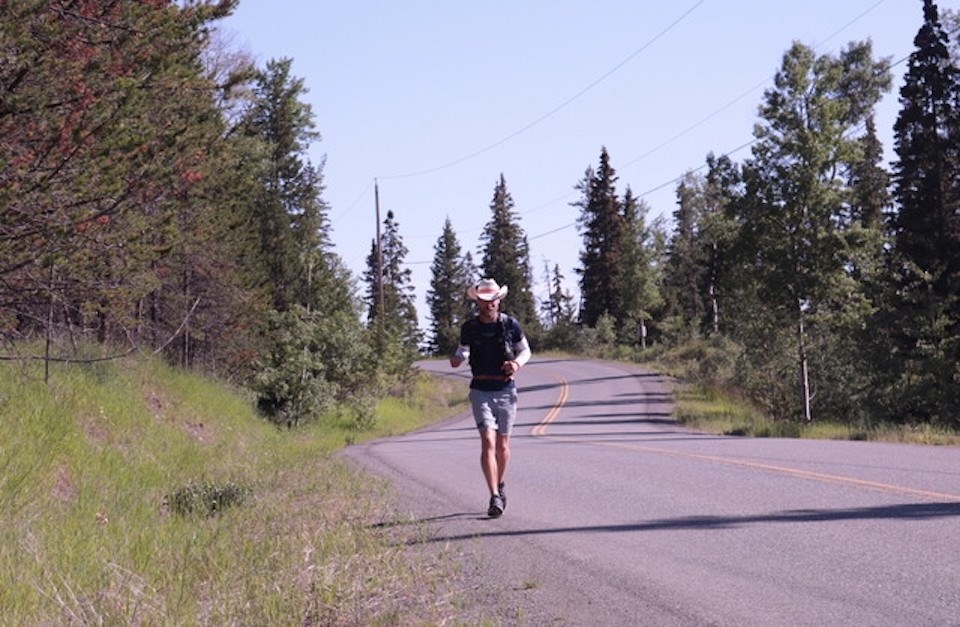An ultramarathoner from Alberta is just days away from completing his attempt to be the fastest person to run across the country.
41-year-old Dave Proctor, who has run an average of 107 kilometres per day for over 60 days straight, stopped in Kamloops over Sunday night before heading south on foot along the Coquihalla Highway.
Proctor’s goal is to break the TransCanadian speed record, currently held by Al Howie who ran across the country in 72 days and 10 hours in 1991. If Proctor finishes according to schedule, he will finish in 67 days.
Speaking over the phone as he ran near Inks Lake on Monday, Proctor told Castanet Kamloops he feels “a mixed bag of emotions” with three days to go before the finish line.
“I knew the final two weeks would be really, really hard, and every day moving forward — like today is harder than yesterday. I feel completely depleted and exhausted, and there's not a lot left in the tank,” Proctor said, adding he sees this as a sign he’s done it right — gone fast enough and far enough each day.
“But I’m also feeling that I put in 64 full days, and this is a lifelong dream to do this. I knew it was going to be hard, and I knew I was up for the challenge of getting this done. So I feel very emotional, I feel really really high, and then really, really low all in the same breath.”
Proctor, who is from Okotoks, Alta., started his journey on May 16 in St. John’s, N.B., and plans to finish on Thursday, July 21 in Victoria, at the Terry Fox monument.
He said each day, he gets up in the morning and eats breakfast while using a theragun to massage his legs.
Proctor said at this point, it is very painful to put weight on his feet and ankles when he gets up in the morning.
“I can’t even get out of bed,” Proctor said, adding that once he starts moving, his legs start to improve.
He will then be driven to where he finished running the day before — usually backtracking about 50 to 100 metres to ensure he completes the full distance.
Proctor said he runs on his own — without a tail vehicle, as he believes this is unsafe — and meets up with his crew vehicle which stops every 10 to 20 kilometres to get food, drink and sunscreen.
After he hits 107 kilometres, he ends his run for the day, and eats until he goes to sleep.
“Within probably an hour and a half of getting done my day and eating my food, I’m falling asleep with food in my mouth, because I’m just so tired. And the alarm goes off at four o'clock the next morning, and it's Groundhog Day.”
Proctor, an accomplished runner with several Canadian records under his belt, said he has been tackling ultramarathons — races longer than a standard 42 kilometre marathon — for 17 years, with years of preparation completing long and shorter distance events.
Proctor said he trained for the TransCanada distance by running about 300 kilometres per week, but the most significant training took place mentally.
"When things start getting hard, it's normal for the human brain to want to quit, and give up and pull back, and it's self-preservation, is what it is. But it’s a lie that we tell ourselves when we think that we're in trouble, but we're really not in trouble,” he said.
“I have to remind myself all the time that you cannot believe the lie that I'm telling myself.”
Proctor said his most challenging times on the road came when he ran through an illness in the early days of his journey — he suspects it was COVID-19, although his test came back negative — and after he suffered a fall on Day 40, hitting his head and losing consciousness.
“I feel that if I could get through that, I can kind of get through anything,” Proctor said.
He said the greatest moments come from experiencing his country on foot, witnessing the beauty in each distinct region — from Newfoundland and Cape Breton, to the St. Lawrence River in Quebec and Lake Superior in Ontario.
“The beautiful canola fields when the wind is blowing through them in Saskatchewan, and these Canadian Rockies, the majestic Rockies, in B.C. I've had a very intimate experience with my country that I wouldn't have had doing anything else,” Proctor said.
“That’s what I think my greatest takeaway is— just these experiences, every moment that you look around and smell and taste, it’s been so enriching. And I feel so much more Canadian now than I've ever felt.”
Proctor said he set this goal in order to push himself and live his life to the fullest.
“I'm pushing myself to my extreme, and I want to live in this life — I don't want to just exist. And I feel like I'm doing that right now, I'm living my life to my to my fullest,” Proctor said.
“Everybody's got a different definition of that. But I want to be in a rocking chair when I'm 85 years old, and know that this Canadian record still stands, and that when I was 41 years old, I gave it my all. And I left nothing on the table.”




